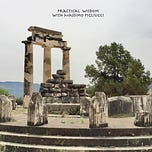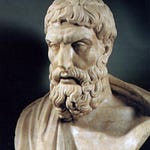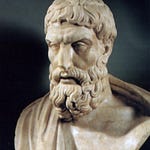“But should we grant them even this, that people are by death deprived of good things; would it follow that the dead are therefore in need of the good things of life, and are miserable on that account? …
Can those who do not exist be in need of anything? To be in need of has a melancholy sound, because it in effect amounts to this — they had, but they have not; they regret, they look back upon, they want.
Such are, I suppose, the distresses of one who is in need of. Are they deprived of eyes? to be blind is misery. Are they destitute of children? not to have them is misery.
These considerations apply to the living, but the dead are neither in need of the blessings of life, nor of life itself. But when I am speaking of the dead, I am speaking of those who have no existence. …
‘To want,’ then, is an expression which you cannot apply to the dead. …
When such an expression is used respecting the dead, it is absolutely unintelligible. For to want implies to be sensible; but the dead are insensible: therefore, the dead can be in no want.”
(Tusculan Disputations, I.36)













Share this post